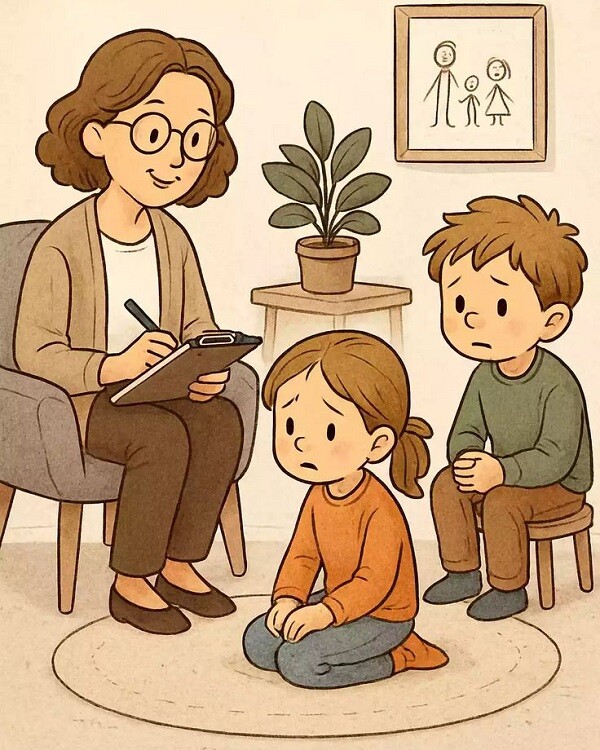The power of suggestion is an essential tool when guiding children who lack life experience.
While suggestions may not be explicit, they spark curiosity and allow children to predict certain outcomes. A guiding parental role is more effective than stating clear-cut results.
Most parents accompany their children on their journey to adulthood. Therefore, if parents have inappropriate parenting perspectives, their children will struggle to succeed as they grow up. Thus, many believe that one can predict a child’s future by observing how their parents educate them.


Parents who constantly imply their child’s faults will struggle to raise confident individuals.
“Look, I spent a lot of money on your dance lessons.”
“When you were little, your health was poor, and one night I had to take you to the hospital. I remember that night, cycling there in the freezing cold…” While it is essential for a mother to express her love, care, and sacrifices to nurture gratitude and understanding in her child, doing so too frequently can have unintended consequences.
In reality, a child’s perception may differ from their mother’s. The child may feel guilty and believe that no matter what they do or how well they do it, they will always fall short. In some cases, the mother may cry and complain about her challenging life.

Frequent complaints about one’s struggles can have unintended consequences.
Educator Makarenko states: “Doing everything for the child, even sacrificing one’s own happiness, and letting the child endure everything is a terrible gift from parents.”
In this scenario, while the mother believes that a sense of guilt can motivate her child to improve, the child may instead become mired in negativity and be unable to escape. This can lead to shyness, a lack of confidence, and a reluctance to pursue their dreams.
Psychological predictions by parents about their children are often disproportionate. Prolonged feelings of guilt in children can lead to an inability to meet expectations, and self-confidence may diminish over time.
To avoid this, mothers should seek more positive ways to communicate with their children. Instead of focusing solely on sacrifices and struggles, highlight the good things your child has done and celebrate small daily successes.

Parents who send negative signals and discriminate against their children’s friends hinder their happiness.
“Don’t play with that child. Their academic performance is very poor. Last month, their teacher reprimanded them…”
In a child’s world, there is no discrimination. If they like someone, they will interact openly, play happily, and discuss their studies. However, many parents unconsciously categorize those around them into different levels. They tend to look down on children who perform poorly in school and favor those with good academic records.
In reality, if the mother is the primary caregiver, the child will likely follow her goals and parenting methods. Thus, if the mother conveys negative societal signals, the child may feel pressured and develop negative biases. They may start to question their ability to make friends, leading to self-doubt and anxiety.

Parents who send negative signals may influence their children to discriminate against their friends.
When parents transmit negative signals about society, their children are less likely to be happy.
Furthermore, discriminating against children based on academic performance can create an unhealthy environment. Children may feel judged and unaccepted. Those who are looked down upon become more cautious about expressing themselves, hesitate to interact, and may miss valuable learning opportunities from their peers.
Children need to understand that everyone has unique value, and academic performance is not the sole measure of a person’s worth. If parents focus solely on grades and achievements, children may neglect essential social skills such as empathy, cooperation, and communication.
Therefore, to rectify this situation, parents should aim to nurture a generation of confident and open-minded individuals. Encourage your children to make friends with diverse peers, regardless of academic performance.
Help them realize that everyone has strengths and weaknesses, and embracing diversity in relationships will provide valuable life lessons.

Parents who make unrealistic suggestions beyond their child’s abilities struggle to teach them about reality.
In some cases, mothers encourage their children to pursue far-fetched dreams without discussing the practical challenges they will face.
For example, “You must dream big to match our family’s stature!” or “You should become a doctor”, without emphasizing that pursuing dreams requires effort, perseverance, and sometimes, facing failures. This can lead to disappointment when challenges arise, as the child may not have the necessary skills to overcome obstacles.
In reality, a mother’s implications significantly impact her child’s life. However, without honest communication, misunderstandings can occur, leading to feelings of rejection and low self-esteem.

Mothers who make unrealistic suggestions beyond their child’s abilities.
Thus, parents also need to learn how to provide positive suggestions to their children. Encourage them to develop their interests, discover their true passions, and embrace their uniqueness…
Each child must walk their path, and parents are there to guide and support them along the way. However, it’s essential to understand that support does not mean control but rather creating an environment where children can freely choose and pursue their passions. When children realize that their parents are there to support them without imposing their will, they will develop independence, confidence, and self-appreciation.
Ultimately, parenting should aim for the development of a child’s character and self-reliance. Parents should not only be leaders but also companions, creating a safe space for their children to grow and explore the world. That is the most precious gift parents can give their children.
7 Things Parents Say That Demoralize Their Children, and How to Avoid Them
Wise parents, beware! There are certain phrases that may seem encouraging, but can actually do more harm than good when said to your children. It’s time to rethink the way we communicate with our little ones and unleash the power of positive parenting. Uncover the hidden dangers of these seemingly harmless phrases and embark on a journey of effective communication with your children. Prepare to be enlightened as we unravel the truth behind these well-intentioned yet detrimental words.
“The Hungry Mouse Effect”: Nurturing Your Child’s Drive to Succeed
The Hungry Mouse Effect is an innovative parenting approach that fosters resilience and emotional maturity in children, setting them up for future success. This method empowers young individuals to navigate life’s challenges with a strong sense of self, enabling them to thrive and achieve their aspirations.






































